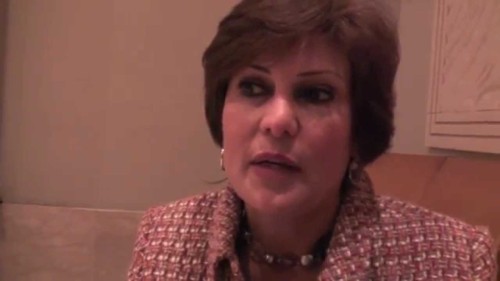Salwa Saad Bugaighis, a prominent human rights activist in Libya, was killed in an attack at her home on June 25.
Bugaighis, a trained lawyer who lived in Benghazi, was involved in the uprising against the Qaddafi regime in 2011.
An interview in November 2011:
Her continued work for democracy, women’s rights and freedom had led to death threats from Islamic extremists.
The activist had returned home to vote in Libyan elections when gunmen shot her and abducted her husband, Issam, who is still missing.
Human Rights Watch and Hivos, a Dutch-based NGO promoting rights and citizenship, were among those posting tributes:
A Voice of Courage Stilled in Libya
Human Rights Watch
The Libyan lawyer and human rights activist Salwa Bughaighis always made a head-turning sight on the streets of Benghazi. Unveiled and striding confidently to meeting after meeting, she was one of the few who continued to challenge Islamist militias despite increased threats and violence. After years of standing up to Muammar Gaddafi’s tyranny and defending Islamist activists, some of whom were now trying to impose their views on her and other women, she continued to stand up for herself and other Libyan women.
On Wednesday, following countless threats against her and her family, Salwa was assassinated, shortly after she voted in Libya’s parliamentary election. With Salwa’s death, the original idealism of the 2011 uprising that overthrew Gaddafi’s tyranny has received another crushing blow, and many Libyan women have lost a role model.
I first met Salwa when a colleague and I were among the first foreigners to arrive in Benghazi in mid-February 2011. It was just days after the Arab Spring protests had, against all odds, wrested control of eastern Libya from Gaddafi’s brutal military, and after days of killings of protesters in the streets. When we arrived at the courthouse in Benghazi that evening, massive crowds of protesters were celebrating their newly found freedom outside, caught between the euphoria of liberation and the fear of what was to come.
Inside the courtroom, we found the people who had led the protests – an unlikely group of liberal lawyers, academics, activists, doctors, and other intellectuals. It may be difficult to imagine looking back from the incredible violence engulfing Libya today, but during those first days of the Libyan uprising, there was a heady idealism in the air. Everyone spoke of building a new Libya with human rights for all, a Libya of freedom, a Libya that would harness its massive oil and gas resources for the development and well-being of its people. There were many guns, of course, but the militias had not yet turned their guns on each other.
Salwa Bughaighis and her sister, Iman Bughaighis, were among the first anti-Gaddafi activists we met, and we became fast friends. Iman served then as the spokesperson for the group, while Salwa was on its governing body –– the National Transitional Council – trying to come to grips with the momentous tasks that lay ahead.
In memory of Salwa Saad Bugaighis
Hivos
Salwa played a very active role in the revolt against Colonel Qaddafi. Her hometown Benghazi was a stronghold of resistance against the dictator in the first half of 2011. After the fall of Gaddafi, the struggle entered a new phase of striving for democracy, women’s rights, freedom and security. Salwa, trained as a lawyer, displayed great perseverance and humanity as she searched relentlessly for opportunities for positive change. She was a member of the National Transitional Council and played a key part in the development of the new Libyan Constitution. Salwa can rightfully be called one of the driving forces in Libya’s political transition.
When she was invited to the Netherlands by Hivos and WO=MEN at the beginning of 2012, we experienced her charisma first-hand during meetings with Dutch parliamentarians, foreign affairs officials and journalists. She proved a brave leader and worthy advocate for a democratic Libya: quiet but determined, and with a sympathetic ear for her interlocutors.
When she was a member of the transitional government, more rights for women and disarmament were placed high on its agenda. However, after a few months she gave up her seat in protest at the lack of women in the new government.
People who knew and worked with her have described the day Salwa was murdered as the day when part of Libya died a sad death – the part that has fought tooth and nail against lawlessness and lack of freedom. But Hivos, together with Salwa’s organisation the Libyan Women’s Platform for Peace, will continue to work to increase the political participation of women in Libya, despite killings like these that make a democratic Libya seem farther away than ever.
Hivos calls for urgent action to bring the criminals who perpetrated this cowardly act to justice. You can help by signing this petition created by Justice For S. Netherlands and hosted by Avaaz.

